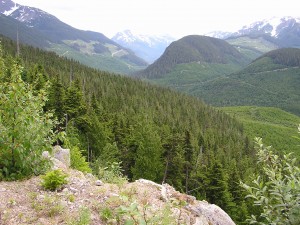 Interior BC communities were surprised and devastated by the mountain pine beetle impacts on their forest ecosystems and forest-dependent communities. For First Nations and municipalities in the Northwest Skeena region, avoiding similar regional climate shocks will challenge community resources and resourcefulness. The Future Forest Ecosystems Scientific Council (FFESC) project, “Climate Change Adaptation Planning for Northwest Skeena Communities” seeks to build regional adaptive capacity in the Northwest Skeena region to address the impacts of climate change by exploring the following questions:
Interior BC communities were surprised and devastated by the mountain pine beetle impacts on their forest ecosystems and forest-dependent communities. For First Nations and municipalities in the Northwest Skeena region, avoiding similar regional climate shocks will challenge community resources and resourcefulness. The Future Forest Ecosystems Scientific Council (FFESC) project, “Climate Change Adaptation Planning for Northwest Skeena Communities” seeks to build regional adaptive capacity in the Northwest Skeena region to address the impacts of climate change by exploring the following questions:
- What are the potential impacts of different climate and land-use scenarios on the water, fisheries, forest and non-timber forest values and resources of the NW Skeena region?
- How could climate change impact the cultural, social, and economic values of communities and stakeholders?
- What is the capacity for communities to stakeholders to mitigate and adapt to potential climate change scenarios?
- How could natural resource and land management be restructured to promote ecosystem resilience while optimizing opportunities for cultural sustainability and socio-economic development in light of potential climate change impacts?
Vision
To create a coherent context for leaving Northwest Skeena Communities in an empowered condition to be able to develop their own climate change adaptation plans, by identifying knowledge gaps, and giving local community leaders and resource managers the experience and tools to become extension agents for climate change adaptation.
Skeena Communities in an empowered condition to be able to develop their own climate change adaptation plans, by identifying knowledge gaps, and giving local community leaders and resource managers the experience and tools to become extension agents for climate change adaptation.
Approach
Recognizing that the health of communities is closely tied to the health of terrestrial and aquatic ecosystems, this project consists of 4 key research elements:
- Sociological Research
- Regional Climate Modelling
- Fisheries Sensitive Watershed Monitoring
- Cumulative Effects Analysis of Forestry and Resource Operations
Objectives and Deliverables
Final products for this project will evolve with the results and findings from sociological research and community engagement, and will include:
Climate Change Adaptation Tool-kits – maps and other visualizations depicting potential climate scenarios, findings and recommendations derived from community consultation and sociological research, baseline data important for informing and evaluating adaptive actions and planning, scenario-based planning activities to facilitate community-led exploration of future scenarios. All materials will be published online and available for public use.
Community Workshops – to be held in each participating community to share results from sociological and biophysical research, and to understand how these findings relate to local values, traditional ecological knowledge.
Sustainability Matrices -a tool that used to identify current conditions of community and environmental resources, and the perceived importance of these resources to community well-being. This tool will be helpful in identifying future scenarios and specific issues around which planning could be constructed to achieve optimal goals.
Fisheries Sensitive Watershed Monitoring Framework – A framework developed through the collaboration of multiple experts and stakeholders to monitor the effectiveness of policies aimed at protecting and improving water quality in Fisheries Sensitive Waterways. The inclusion of climate change data into this monitoring framework is unique.
Regional Data on Climate Change– Analyses of how different climate scenarios could impact specific regional values.